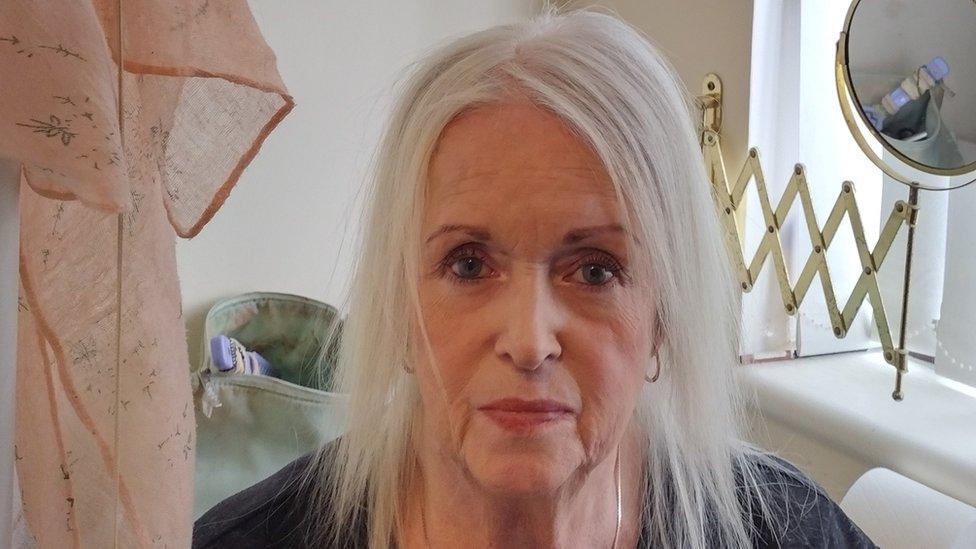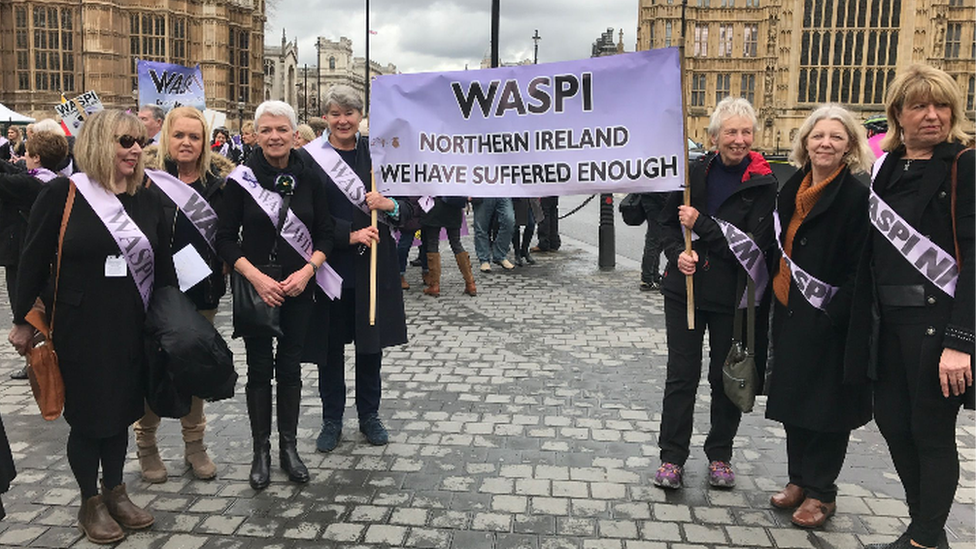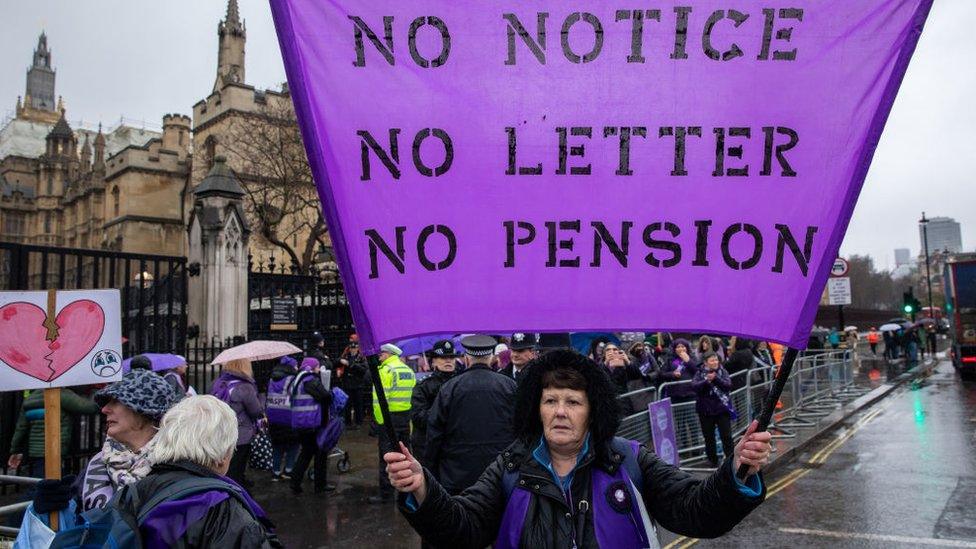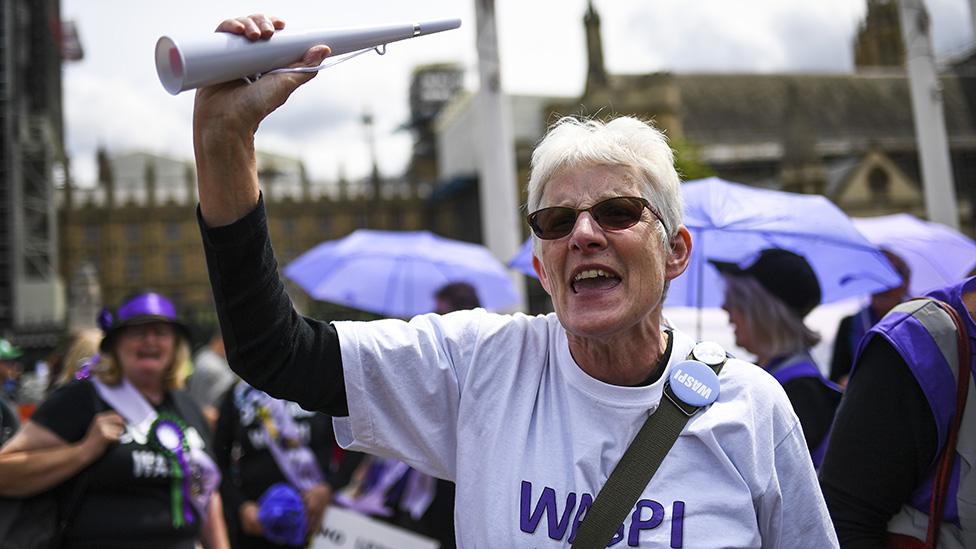Waspi campaign: NI woman feels 'betrayed' by pension changes
- Published

Shelley Leggett, now 68, is among campaigners who say they have lost tens of thousands of pounds due to pension changes
"Both my mum and my sister got their pensions at 60; I had no reason to believe I would be any different."
When Shelley Leggett was 58 years old she was looking forward to retiring at 60, until a letter arrived in the post that shattered all her plans.
She was one of thousands of women born in the 1950s who were told they would have to work six years longer than they expected to get their state pension.
"It's just an awful blow, when you think you're at the end of your working life, or almost at the end - to find that in fact instead of two years, you have eight more years to do."
The Belfast woman joined the campaign group Women Against State Pension Inequality (Waspi) to lobby against the "unfair way" changes were made to their pensions.
This week, the group won a significant victory when a UK watchdog said women in this age group should receive compensation - not for the years of pension payments they lost out on, but for the failure to communicate with them about the new rules.
The Parliamentary and Health Service Ombudsman (PHSO) found that the government failed to adequately inform women born in the 1950s about the impact of changes on their lives.
"I feel we're vindicated," Ms Leggett told the BBC's Good Morning Ulster programme.
"Clearly we were discriminated against and we weren't informed in time so we could plan our retirement properly."

Local Waspi women took their pension protest to Westminster
But like other Waspi campaigners, she is very disappointed by the recommended compensation levels.
Based on sample cases, the PHSO has recommended payments of between £1,000 and £2,950 but the PHSO does not have the power to force the government to accept its recommendations.
The Waspi campaign has suggested women affected by the lack of communication should receive £10,000.
A separate campaign group, Backto60, has campaigned for the state pension age for women affected to be returned to 60, and for these women to be refunded the pensions they had "lost" owing to the changes.
Ms Leggett described the amounts discussed as "a drop in the ocean compared to what we've lost".
"Yes of course we feel betrayed," she said.
"I mean, £1,000 to £2,000, compared to about £50,000 that we've lost over those six years?"
The campaigner and former civil servant had worked since her teenage years - taking part-time jobs after school, before getting her first full-time job at 18.
Like many women of her age, her opportunities to earn were interrupted by caring responsibilities.
She paused work for a number of years when her three children were born and she has also spent several years caring for her elderly mother.
Ms Leggett will celebrate her 68th birthday next week and has now fully retired on her state pension, but she is still helping to care for her mother who is now 92 years old.


A Waspi campaigner protests outside the Houses of Parliament on International Women's Day in 2023
When did the rules change?
From 1948 until 2010, the age at which men could receive their state pension (provided they had made enough National Insurance contributions) stood at 65.
During that same period the pension age was lower for women - they could draw their pension once they reached 60.
In 1995, legislation was passed to gradually equalise the rules for men and women, external, aiming that by 2020 everyone would have to wait until their 65th birthday.
But in 2011, this process was accelerated, as the government brought its gender equalisation target forward to 2018.
But it did not personally inform the thousands of women who were affected by the changes.

"I got a letter telling me I had enough contributions for a full state pension. That was in about 2012 - no mention that the age was going up," Ms Leggett recalled.
A few years later, as she was preparing to retire on her promised full pension, she received another letter informing her that her new pension age was 66.
She believes she has missed out on tens of thousands of pounds as a result of the changes and she is not alone.
"Some women had their divorce settlements stopped at age 60, so clearly the courts didn't even know that the age was going up to 66," she points out.
The Waspi campaign was set up in Britain in 2015 and Ms Leggett is one of about seven women who represent its Northern Ireland branch.
They took their protest to Westminster a few years ago, where they lobbied Northern Ireland MPs and peers for their support.
Ms Leggett also attended Waspi information events in Belfast's Shankill area and in Strabane, County Tyrone, to warn local women about how their futures could be affected.
This story was updated on 15 May 2024.
- Published18 December 2024

- Published21 March 2024
